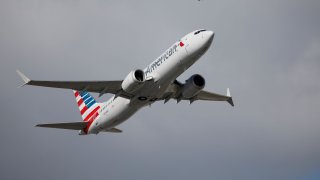
- Fuel supply delays and constraints are the latest issue to hit U.S. carriers.
- Airlines are also facing labor shortages after a surge in travel demand materialized faster than executives expected.
- American said it is among several carriers facing the fuel supply shortage.
American Airlines on Monday said it might have to add stops to certain flights because of fuel delivery delays at some small and midsize airports and asked pilots to save fuel when possible, the latest headache during a surge in summer travel.
The carrier said airlines, including American, have experienced the delays due to a lack of truck drivers, trucks and fuel supply.
"American Airlines station jet fuel delivery delays initially affected mostly western U.S. cities, but are now being reported at American stations across the country. Delivery delays are expected to continue through mid-August," John Dudley, managing director of flight operations, told pilots in a memo, which was reviewed by CNBC.
We're making it easier for you to find stories that matter with our new newsletter — The 4Front. Sign up here and get news that is important for you to your inbox.
The airline said flights will carry additional fuel into airports affected by shortages, a procedure known as tankering or add fueling stops.
"As our country continues to face multiple challenges, let's work together as a team to operate reliably, safely and as efficiently as possible," Dudley wrote. He asked that pilots to use fuel saving strategies such as taxiing with a single engine.
American said that the flight disruptions because of fuel supply shortages have so far been "minimal" and that it hasn't had to cancel any flights as a result of them.
Money Report
"Our team continues to work around the clock to monitor the situation and minimize the impact on our customers," the airline said Monday in statement.
A Delta Air Lines spokesman said the carrier has seen some fuel delay issues at some smaller Western airports but that it hasn't had operational problems as a result. Southwest Airlines also hasn't had any disruptions because of fuel issues, but it could turn to tankering if needed, a spokesman said.
"We have been and continue to be in communication with federal authorities and pipeline operators to address this jet fuel capacity issue," said Airlines for America, which represents most large U.S. carriers.
Captains have the authority to decide how much fuel is on aircraft.
"We want to make sure the safety margin is protected and we also want to make sure we aren't leaving passengers behind," said Dennis Tajer, spokesman for the Allied Pilots Association, which represents American's roughly 15,000 pilots.
The fuel supply issues have sprung up during a surge in domestic leisure travel demand, which U.S. airline executives say is near or above 2019 levels.
Many international destinations require negative Covid-19 test results or proof of vaccination for entry or are closed to visitors altogether. That has driven up demand for U.S. travel this summer, particularly flights to smaller airports near outdoor tourist attractions.
On Saturday, Nevada Gov. Steve Sisolak and several lawmakers said they were working to prevent potential fuel shortages at Reno-Tahoe International Airport and ensure that aircraft used to fight wildfires have enough supply.
Bozeman Yellowstone International Airport in Montana had fuel delivery delays for about half a day earlier this month, which disrupted less than a fifth of daily flights, said an airport spokesman.
More than 223,000 passengers boarded or deplaned at Bozeman's airport last month, a record and up more than 35% from the same month in 2019, according to airport data.
Air travelers have also faced hourslong hold times for airline customer service as well as long lines at airport restaurants and other vendors due to staffing shortages.
Airlines urged employees to take leaves of absence or buyouts to reduce labor costs during the pandemic last year but travel demand rebounded faster than many airline executives expected and carriers are scrambling to hire and train workers.






